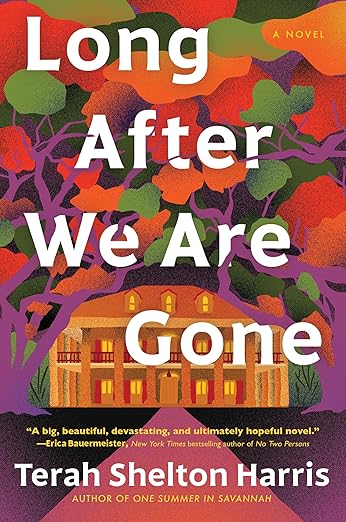I love books that teach me something without it feeling like a lesson, which is why I gave the novel Long After We Are Gone, by Terah Shelton Harris, a rare five stars shortly after devouring it. I read a lot of character-driven fiction, but I knew this one was different when it opened with an author’s note*. Turns out, Harris is a librarian—and she includes just the right amount of historical context to help me understand the story’s backbone; where the fiction began and ended.
The author rightly assumed I would know nothing about heir properties, which is land that was passed down without wills or deeds by Black families in the South. “Heir property does not constitute a clear title,” Harris explains, “which means the land is vulnerable to developers, corporations, and governments to use laws to acquire the land.”
The four siblings who narrate Long After We Are Gone obviously didn’t read the author’s note, because they don’t know much about heir property either when the book opens. But on the very first page their father King suffers a fatal heart attack, so they are forced into a crash course about how this surprisingly uncertain ownership will affect their future dreams—and why King’s last words were “Don’t let the white man take the house.”
The battle for their inheritance forms the backbone of the story, but it was the very distinctive faults of the two brothers and two sisters that kept me turning pages. Would one learn sign language so he could communicate with his son? Would another accept himself and his sexual orientation? Would the sisters overcome their very, very different obsessions and be able to move on to more fulfilling lives?
There was more violence than I would’ve preferred, and perhaps more description than was really needed; the trigger warnings (also in the author’s note) were definitely appropriate. But this sensory overload can be blamed in part on the quality and power of the writing, which dropped this reader right into each scene. I could almost smell the wood dust in the workshop when Mance, trying to accept that his baby son Henry might never hear, first tells us that “sound is everything:”
“When he thinks about Henry navigating the world in silence, his heart quickens—first with anxiety, then with something else. Something he doesn’t have the words for yet.
“So, he sands… because the truth won’t stop hurting. He sands until the sandpaper tears and the pads of his calloused fingers go numb, until wood dust floats in the air, until the sun creeps up on the entrance of the workshop.”
The way Harris braids together interior worry with exterior sensation enriches both. And, reading this short passage through once more, I’m also stunned by the power of one well-placed tiny word—that “yet.” It signals that Mance will change and grow, even though he doesn’t necessarily want to.
I recommend this book to those who enjoy learning through the fictional lens of flawed characters. It’s also a great reminder that “what is mine to do” is not just for writers; living our best lives is the only thing that can make us truly happy.
What are you reading as the nights grow longer? Share your thoughts in the comments below, or send me an email. I read every single one, with gratitude.
Read my previous book reviews
*I just started reading Harris’s debut novel, One Summer in Savannah—and it also opens with an equally useful author’s note, complete with trigger warnings. Also equally engrossing!

Thanks, Carol. This sounds fascinating. Your review reminds me of If Sons Then Heirs written by my friend Lorene Cary. It, too, is about a Black family wrestling with the inheritance of family land. Cary is a multi-faceted person: an activist, educator, writer, and person of huge generosity who lives in Philly. You might find her work interesting.
Alice, thanks for bringing Cary’s book to my attention. Ordered a copy!